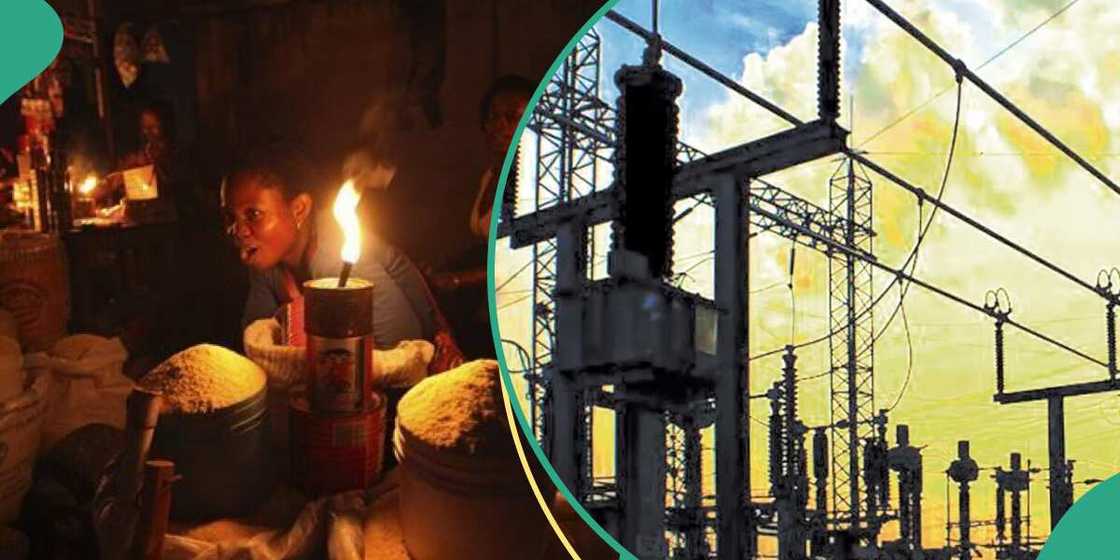National Grid Collapse: All You Need to Know About Nigeria's Recurring Power Problem
Legit.ng journalist Victor Enengedi has over a decade's experience covering Energy, MSMEs, Technology and the stock market.
In October 2024, Nigeria experienced several national grid collapses within a week, plunging homes and businesses into complete darkness. Electricity distribution companies struggled to keep the public informed about the situation through updates.

Source: UGC
Grid failures have become increasingly frequent in the country as the federal government, through the Ministry of Power, works to address the underlying causes.
The Transmission Company of Nigeria (TCN) reported in May 2024 that the nation experienced 105 grid collapses between 2015 and April 2024, attributing the issue to problems across the electricity value chain.
Even though the TCN has claimed that grid collapses in the last five years (2020-2024) have declined by 76% compared to the previous five years (2015 to 2019), the blackouts continue to re-occur.
PAY ATTENTION: Legit.ng Needs Your Help! Take our Survey Now and See Improvements at LEGIT.NG Tomorrow
What is the national grid?
The national grid is a unified system designed to transport electricity from producers to consumers.
This intricate network involves generation and distribution companies, as well as the Transmission Company of Nigeria.
It includes power plants that generate electricity, a transmission system that moves electricity from production sites to distribution networks, and a distribution system that delivers the electricity to households, businesses, and other users.
National grid collapse in Nigeria
A national grid collapse in Nigeria occurs when the entire power transmission system fails, resulting in extensive electricity outages nationwide.
Such failures disrupt electricity supply, impacting homes, businesses, and critical services. The grid is designed to function within specific parameters to ensure stability.
However, when these limits are surpassed, or there is an imbalance between power supply and demand, instability can result, potentially causing a grid collapse.
Why national grid collapses
The national grid is designed to operate within specific limits to maintain stability. When these limits are exceeded, instability can result, ultimately leading to grid collapse.
The transmission company distributes power to electricity distribution companies based on demand data provided by the National Control Centre.
This process aims to balance power supply and demand, preventing a grid failure.
However, at times, the electricity supplied to the grid is insufficient to meet demand. When this happens, an automatic load-shedding system is triggered.
If the load-shedding fails, generators begin to shut down one by one, leading to a complete grid collapse.
In Nigeria, such mismatches between supply and demand occur frequently, as demand often exceeds the power allocated to distribution companies, especially during peak periods. This issue is compounded by significant transmission and distribution losses.
While the transmission company often works to correct these imbalances, it is not always successful.
In some cases, sensitive generating units trip due to an inability to handle the excess load. If this tripping continues, it can cascade, causing the entire power grid to lose supply.
Several other factors contribute to grid collapses, including insufficient gas supply to power plants, theft or vandalism of grid equipment, and excessive transmission and distribution losses caused by outdated infrastructure.
Additionally, load rejection and the transmission companies' inability to effectively deliver electricity from generators to distributors further strain the ageing and fragile national grid.
Fixing grid collapse through public-private partnership
Speaking on solving the grid collapse issue, Wale Ogundeji, an energy analyst, told Legit.ng that a combination of private and public partnerships would be necessary.
Ogundeji said:
"To fix this, Nigeria must invest in modernizing and expanding the grid through a combination of public and private partnerships. A decentralized approach, emphasizing mini-grids and off-grid renewable energy, can reduce the strain on the central grid. Upgrading transmission infrastructure, ensuring reliable gas supply to thermal plants, and boosting investments in renewable energy will enhance resilience."
He added that improving governance in the power sector, enforcing accountability, and incentivizing local power generation will create a more stable, sustainable electricity supply for the country.
FG set to build super grid
In related news, Legit.ng earlier reported that the federal government has decided to build a new infrastructure known as a super grid, to address the national grid's frequent failures.
The minister of power, Adebayo Adelabu, said the initiative will enhance the nation's transmission network, stabilize the grid, and increase both the capacity and flexibility of the national power system.
Adelabu criticized the current national grid, stating that its current condition is insufficient for the power sector's future goals.
Proofreading by Nkem Ikeke, journalist and copy editor at Legit.ng.
PAY ATTENTION: Сheck out news that is picked exactly for YOU ➡️ find the “Recommended for you” block on the home page and enjoy!
Source: Legit.ng


